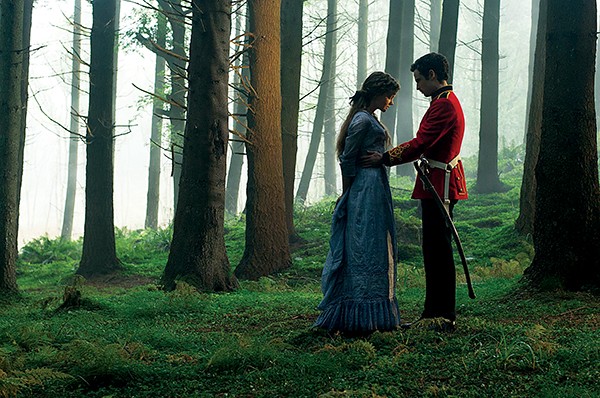The bucolic British countryside, like pornography, has a preordained end. BBC Films like Far from the Madding Crowd, which haunt our PBS stations and Academy Awards, are full of restrained and elevated diction and dress working their way to release.
Far from the Madding Crowd enriches this formula by placing Carey Mulligan front and center, often photographed in front of beautifully filmed landscapes as if green-screened there. Mulligan is great at registering emotions on her face and working to sequester them in her mouth. With a shock of mad-scientist hair dribbling over her forehead and a triple set of dimples, she constantly looks left and right and communicates sharply whatever her character won’t say.
Her costar Matthias Schoenaerts is a great match as Gabriel Oak, a beautifully bearded, aptly named rugged bit of handsome restraint. Their meet-cute over sheep is edited briskly, the vibrant colors of her dresses and the rolling hills changing to suggest even the editor is bored with this genre. As the film starts, it’s a pleasure to watch Mulligan turn down a series of too-sudden marriage proposals: She comes off like a modern girl in a world of traditional male suitors.

Carey Mulligan and Tom Sturridge
But unfortunately, as an adaptation of Thomas Hardy’s early novel, the movie cannot go where the casting and early scenes suggest and create a kind of In the Mood for Love for Wessex. Nods toward the difficulty of being a woman in a patriarchal agrarian society are made. Work is something mostly offscreen or metaphorical and delegated to peasant types. The English-speaking past is exoticized as a place where mildly aristocratic people can get over their shyness and find love.
As always, animal husbandry and farming are there to give something elemental: Udders are milked, fields shine, tadpoles are glimpsed in pools, but there is a remove — you know none of these details will touch the main plot or heroine. Andrea Arnold’s Wuthering Heights did this, but better. The brutality of everyday animal murder on a farm, which looked real but was fake, sold both the violent passions of the narrative and the alien nature of the past through the outsider protagonist’s eyes.
Here, the dark melancholy of later Hardy books isn’t fully formed in the plot. The most evocative non-romantic bit comes early, when Oak’s sheep get herded off a cliff to smash on a beach and Oak bitterly shoots the responsible dog. That rough-hewn shock gives way to a standard plot and two well-cast but underwritten suitors. Michael Sheen’s Boldwood is all obsession and stammering. Tom Sturridge’s Sergeant Troy has a pool-cue nose, pert moustache, and pouty lips straight out of villain central casting. But they lack definition, and when the story jumps forward in ellipsis and suggestion, we don’t know how to take it. The pair primarily embody the two mistakes of marrying for sex and money, but only that. There’s a great bit where Troy drops his caddiness as he talks to his pregnant ex-girlfriend. It suddenly seems like the story will be jarringly modern, and the characters will mutually recognize that while illegitimate pregnancy in the 1800s may be a scandal, financial accommodation for destitute mothers is a must.
Likewise Troy’s erotic and possibly metaphorical sword prowess demonstration in the woods is another nicely jarring bit where the movie suddenly seems like it could go anywhere other than the regular stops. Sex might not result in shame. Choosing the wrong first boyfriend might be an ordinary misstep. But the movie adheres to Hardy’s plot without enthusiasm. A late murder is not set up well, and the body lands like a feather.
What works are Mulligan and Schoenaerts. Arguing over a scythe sharpener, degasifying the bellies of sheep, working to cover phallic haystacks in the rain, their sly rapport is better than the plot. Mulligan so often does this kind of character well. In Never Let Me Go and Drive, she played restrained characters who interact painfully with the world. But those worlds were weirder. Here, director Thomas Vinterberg, one of the Dogme 95 creators, is far too normal. Mulligan’s character avers her independence constantly, to the end uninterested in affirming marriage proposals, even as she is stuck in a movie operated by their mechanics.